Third IPSI Global Conference (IPSI-3) and CBD COP11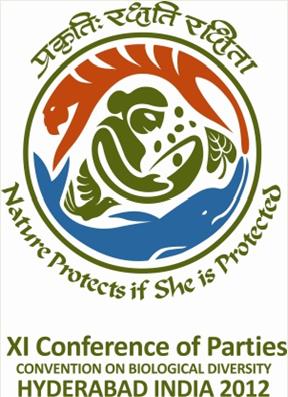
October 2012 marked an exciting month for IPSI, as its members gathered in Hyderabad, India for the Third IPSI Global Conference back-to-back with CBD COP11.
The success of IPSI-3 and the associated events would not have been possible without the tremendous energy and commitment of participants, who shared their knowledge and expertise. Taking this opportunity, the Secretariat would once again like to thank all of those who contributed to these events.
This November 2012 newsletter includes some photos and information about these events, and more detailed information along with downloadable presentation files are available on the
website.
Programme of Events (co-)organized by IPSI Secretariat
|
06 October
|
IPSI-3 Assembly (programme) |
|
07 October
|
IPSI-3 Public Forum (programme) |
|
09 October
|
“IPSI Evening” (flyer) |
|
11 October
|
CBD COP11 Side Event “Achievements and Further Development of IPSI” (flyer) |
|
12 October
|
Community Palli Session “Linking Community and Landscape Resilience” (flyer) |
|
|
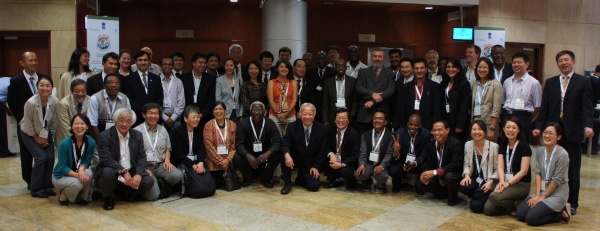
IPSI Members gather for a group photo following the IPSI-3 Assembly in Hyderabad, India
IPSI-3 Assembly: Strategy Endorsed, Venue for IPSI-4 Announced
Key Outcomes:
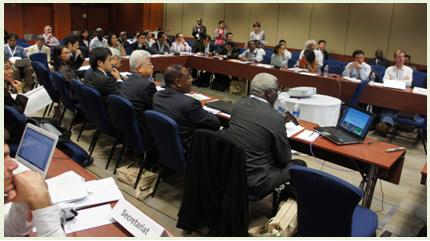
Prof. Alfred Oteng-Yeboah (Steering Committee Chair) addresses the Assembly
1) Dr. Jo Mulongoy presents final draft of IPSI Strategy, which was then endorsed by the General Assembly.
2) Japan’s Fukui Prefecture officially offers to host IPSI-4 in 2013, a proposal welcomed and approved by the Assembly.
3) Many members of the IPSI Steering Committee renewed their terms with the Assembly’s approval, while four IPSI members were welcomed to the Steering Committee by the Assembly: International Tropical Timer Organization (ITTO), MS Swaminathan Research Foundation (MSSRF) Community Agrobiodiversity Research Centre, Faculty of Science, University of Sarajevo, and the Secretariat of the Pacific Regional Environment Programme (SPREP).
IPSI-3 Public Forum: Contribution to Achieving the Aichi Biodiversity Targets
Key Outcomes:
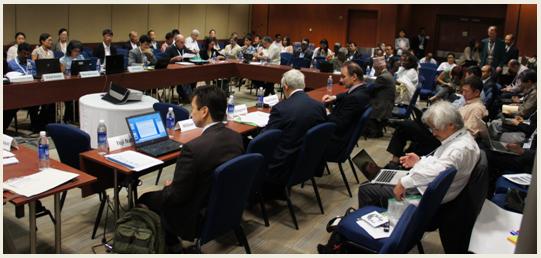
Participants during the IPSI-3 Public Forum gather for Plenary Presentations
1) Co-chairs Yoko Watanabe (GEF Secretariat) and Anil Kumar (MSSRF) facilitate Public Forum.
2) David Duthie (SCBD) contextualizes discussions with
presentation on Aichi Biodiversity Targets.
3) Participants join three group discussions:
- Working Group 1: Indicators of Resilience in Socio-ecological Production Landscapes and Seascapes (SEPLS)
Facilitator: Dr. Pablo Eyzaguirre (Bioversity International)
- Working Group 2: Creating Synergy between Traditional Knowledge and Modern Science
Facilitator: Dr. William Olupot (Nature and Livelihoods)
- Working Group 3: Multi-stakeholder Collaboration towards Sustainable Production and Consumption
Facilitator: Dr. Yoji Natori (Conservation International)
“IPSI Evening”: Achievements and Further Development of IPSI
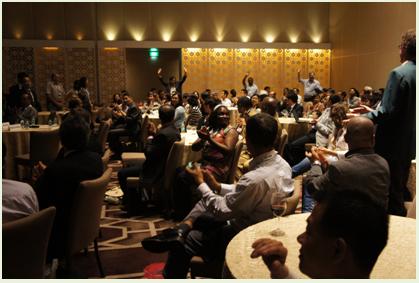
Steering Committee members introduce themselves during IPSI Evening
Key Elements:
1) Over 130 participants attend event, with opening speeches by Kazu Takemoto (Director, IPSI Secretariat) and Masanori Nakano (Consul General, Consulate General of Japan, India).
2)
Keynote address delivered by Prof. Kazuhiko Takeuchi (Vice-Rector, United Nations University) under theme “IPSI: Perspectives on Socio-ecological Production Landscapes and Seascapes”.
3) IPSI member presentations delivered by:
Dr. Wanja Dorothy Nyingi (Kenya Wetlands Biodiversity Research Team); Mr. Susumu Fujiwara (Ishikawa Prefecture, Japan); Prof. Senka Barudanovic (University of Sarajevo, Bosnia and Herzegovina) and
Mr. Stuart Chape (Secretariat of the Pacific Regional Environment Programme).
CBD COP11 Side Event: Achievements and Further Development of IPSI
Key Elements:
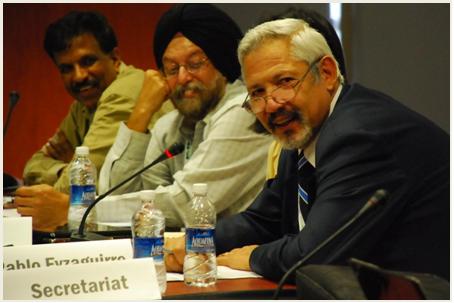
From left to right, Anil Kumar, Prabhjot Sodhi, Pablo Eyzaguirre
1) Short
presentation by IPSI Director, Kazu Takemoto, on IPSI’s development.
2) Endorsed IPSI Strategy
introduced by Dr. Jo Mulongoy and results of Public Forum shared by co-chair Dr. Anil Kumar (MSSRF).
4) Latest
updates on Community Development and Knowledge Management for the Satoyama Initiative (COMDEKS) shared by Fumiko Fukuoka (UNDP) and Prabhjot Sodhi (GEF-SGP).
5)
Updates on development of indicators of resilience in SEPLS by Dr. Pablo Eyzaguirre (Bioversity International).
Community Palli Session: Linking Community and Landscape Resilience
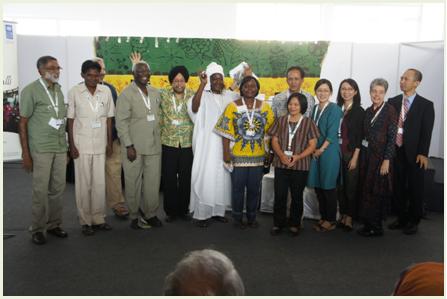
Presenters, discussants and co-chairs
gather for a group photo
Key Elements:
Co-organized by UNDP and IPSI to provide insight into the building of social and landscape resilience, and linkages between these two concepts. <
discussion questions>
Presentations by:
•Ms. Florence Daguitan, Indigenous Peoples’ International Center for Policy Research and Education (TEBTEBBA), Philippines
•Ms. Noelie Ouedraogo, Association Songtaab-Yalgré, Burkina Faso
•Mr. Prabhjot Sodhi, National Coordinator, GEF-SGP, India
•Ms. Vore Gana Seck, Green Senegal, Senegal
•Mr. Cliff Marlessy, Community-based Marine Management Foundation, Indonesia
•Ms. Akane Minohara, United National University Institute for Advanced Studies (UNU-IAS)
•Mr. Piyasoma Bentota, The Committee for People’s Rights (Podujana Himikam Kamituwa), Sri Lanka.
Satoyama Initiative Recognized in CBD COP11 Decision
A growing recognition of the usefulness of the
Satoyama Initiative and its international partnership (IPSI) was evident at CBD COP11 in a wide range of statements of support made, among others, by the government representatives of Japan, Nepal, Ghana, Turkey, Senegal, Timor-Leste, Niger and Thailand.
Decision XI/25 on the Sustainable Use of Biodiversity:
7.
Recalling its decision X/32,
recognizes the contribution that the Satoyama Initiative is working to make in creating synergies among the various existing regional and global initiatives on human-influenced natural environments, including the Man and the Biosphere Programme of the United Nations Educational, Scientific and Cultural Organization, the International Model Forest Network and other initiatives that include community conservation areas developed and managed by indigenous and local communities, and reaffirming that the Satoyama Initiative is to be used consistent and in harmony with the Convention, internationally agreed development goals and other relevant international obligations, and
invites Parties, other Governments and relevant organizations to support the International Partnership for the Satoyama Initiative, as appropriate;
IPSI Welcomes Three New Member Organizations
The IPSI Steering Committee also convened in early October in Hyderabad, India to consider a range of issues, including applications from organizations wishing to join the International Partnership for the
Satoyama Initiative. Three new organizations were welcomed into IPSI, bringing the total membership to 126.
The new IPSI member organizations are:
- Applied Environmental Research Foundation (AERF) --- [India]
- Civil Society Organization Action Ghana --- [Ghana]
- Environment and Development Association “JASIL” --- [Mongolia]
Two of the new member organizations have included introductory messages below, while Civil Society Organization Action Ghana looks forward to introducing itself to the IPSI membership in a future newsletter.
Applied Environmental Research Foundation
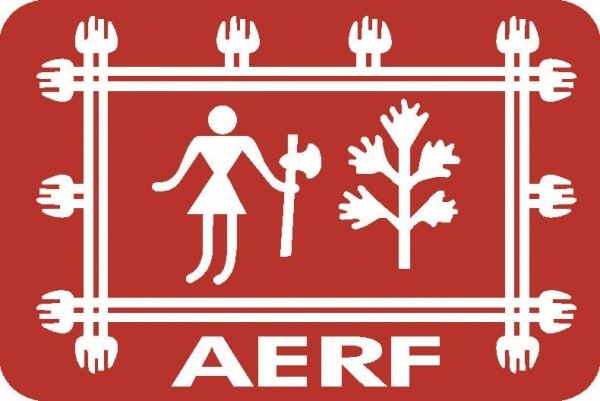
AERF works through 5 programmes in 2 biodiversity hotspots within India. Applied research welded with active local
participation forms the core strategy in all of the Foundation’s programmes. In developing and implementing its programmes, AERF follows a systematic, phase-wise process we call “Conservation on the ground.” The Foundation aims to address the biological diversity loss of a region by building sustainable development models that would also benefit the areas' local populace. AERF believes in community-based conservation or participatory conservation which implies involving people in the process of conservation. AERF operates through a strong network of organizations. Please visit their
homepage for additional information about AERF’s activities.
Environment and Development Association “JASIL”
JASIL’s Mission is to promote sustainable management of natural resources & land use in Mongolia with the advocating study, networking and training for economic development and environment protection by participatory approaches in all levels. JASIL’s vision for IPSI is to support communities with participatory monitoring and evaluation of ecosystem and land use changes and NRM. We work with local communities and other stakeholders on the monitoring the ecosystem changes and climate risk management activities. Currently JASIL has ecosystem monitoring in its 4 study sites, and making grassland monitoring, evaluation and weather forecast data use activities, with the study on socio-economic-ecological indicators for sustainable management of forest and pasture and other NR use in Mongolia.
(homepage)

 AERF works through 5 programmes in 2 biodiversity hotspots within India. Applied research welded with active local
participation forms the core strategy in all of the Foundation’s programmes. In developing and implementing its programmes, AERF follows a systematic, phase-wise process we call “Conservation on the ground.” The Foundation aims to address the biological diversity loss of a region by building sustainable development models that would also benefit the areas' local populace. AERF believes in community-based conservation or participatory conservation which implies involving people in the process of conservation. AERF operates through a strong network of organizations. Please visit their homepage for additional information about AERF’s activities.
AERF works through 5 programmes in 2 biodiversity hotspots within India. Applied research welded with active local
participation forms the core strategy in all of the Foundation’s programmes. In developing and implementing its programmes, AERF follows a systematic, phase-wise process we call “Conservation on the ground.” The Foundation aims to address the biological diversity loss of a region by building sustainable development models that would also benefit the areas' local populace. AERF believes in community-based conservation or participatory conservation which implies involving people in the process of conservation. AERF operates through a strong network of organizations. Please visit their homepage for additional information about AERF’s activities.










